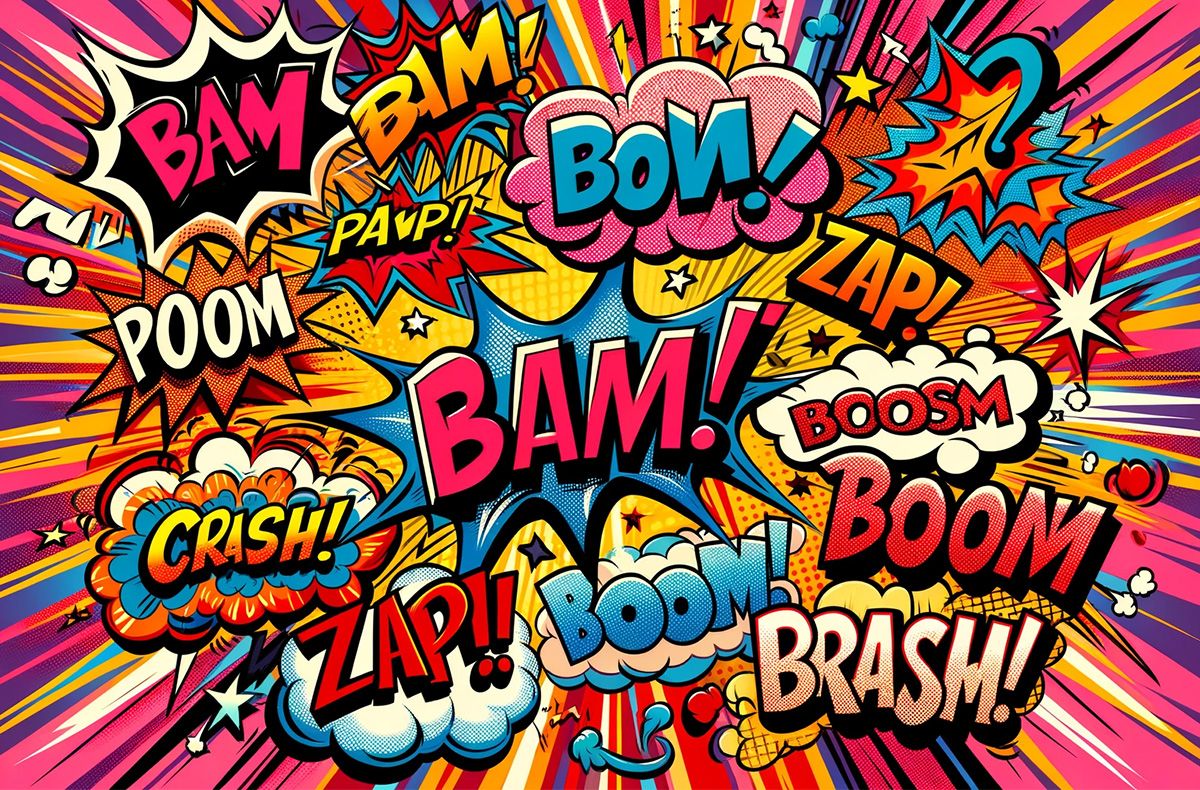Onomatopoeias are the delightful “sound words” that different languages use to describe what we hear in an informal way. Though they are informal (and often sound a bit silly), they are no less important and in fact may be some of our very first words. As infants, we may refer to a dog as a “woof-woof” (English) or a “guau-guau” (Spanish) before we know the actual animal name itself. And aside from the common ones we all know and love, like drip-drop and tick-tock, we are also incredibly inventive with creating (and understanding) our own. Take your car into the shop and you may find yourself saying, “It’s going ‘grun-grun-grun-grun.’ Then when I turn it’s like ‘reeeeee,’” with the mechanic nodding knowingly and already thinking about how to fix your misfiring cylinders and power steering issues.
There are many things we know about onomatopoeias. For example, their child-like and often repetitive or double spellings (beep-beep and tweet-tweet, for example) serve to simplify and emphasize the word’s intent, while also representing the often repetitive nature of the sound being imitated (a telephone’s ring-ring). But these curious words also leave us with questions, namely where do they come from and why are they different around the world?
The Weird Word Itself
It’s not often you come across a six-syllable word in English, and given its definition, you might be led to wonder if the odd-looking word itself is an onomatopoeia. Is that what naming something sounds like? “Ahn-uh-maht-uh-PEE-uh?” Nope. The word can be traced back to Greek, where onoma means “name” and poiein means “to create.” Therefore, onomatopoeia very sensibly means “creating a name.” As we will see, however, the onomatopoeia themselves can seem anything but sensible.
Animal Onomatopoeias
Is the sound an Indonesian sheep makes different from that made by a German or Canadian sheep? Of course not. Animals “talk” how they talk no matter where they are, and we silly humans use onomatopoeias to describe the sounds they are making. So why then does the Indonesian sheep say “Mbeee,” the German sheep “Mäh” and the Canadian one “Baa?”
The answer is that different cultures “bend” the animal sound to fit their own languages’ common spellings and structures. Neither English nor German commonly starts words with “mb-” as seen in the Indonesian sheep’s “Mbeee,” and neither English nor Indonesian has the exact vowel sound of the German “ä.” So each language essentially approximates the animal’s sound, then describes and writes it in a way that is easy and effective for that language.
Some are similar – a cat’s meow for example comes out as miau (German), miaou (French), and 喵 (miāo [Chinese]). Some are wildly different – a bird’s tweet (English) becomes jick-jick in Turkish, pip-pip in Swedish and chun-chun in Japanese. Does “jick-jick” sound like “chun-chun?” Not even close, but since cultures get to set their own rules for how they speak and write, that is how they will remain in Turkey and Japan. And the generations of attentive Turkish and Japanese preschoolers learning these sounds will make sure of that.
Physical Onomatopoeia Sounds
If someone arrives at your door in San Diego, you may get a “knock-knock.” A few miles south of the border, however, that very same sound becomes “toc-toc” in Mexico. And more than one spy novel has used the fact that different languages have different onomatopoeia ingrained into our subconscious by using the sounds as a major plot point. The Argentinean spy with flawless English has gone undercover and infiltrated the US Pentagon. At the hand-off for the top-secret files, he bangs his shin on a table and screams out, “¡Ay!” The jig is up.
Sometimes onomatopoeia will not even make sense in their native language, and this can be seen with some of these physical sounds. Fans of the old Batman comics may remember the liberties writers took to describe the punch and kick sounds. The normal “Pow” and “Bang” were replaced with bizarre sounds like “ZLORP!” and “FLRBBBST!” Weird as they are, they added a bit of color and show that onomatopoeias are not such serious business.
Final Thoughts
So we know that different languages use spellings for onomatopoeias that most easily fit their language’s structure and spelling, but still, why are some of them so incredibly different? Does booming thunder in Japan really sound like “gorogoro?” There is no easy answer for why these large differences remain, and it really goes back to a massive unresolved linguistic question – Why do any words sound the way they do? You can hark back to etymologies and root words to a certain point, but when you look at the big picture, linguists can’t explain why every word sounds the way it does. Perhaps one day researchers will be able to pore through the troves of material in different languages and map it all out, but for now we can just appreciate the intricacies and quirks of language, and especially the wonderful onomatopoeia.


